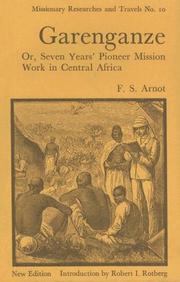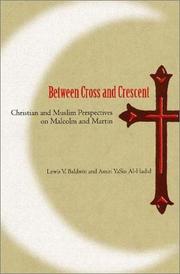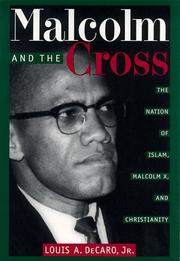| Listing 1 - 10 of 24 | << page >> |
Sort by
|
Book
Year: 1902 Publisher: [S.l.] [s.n.]
Abstract | Keywords | Export | Availability | Bookmark
 Loading...
Loading...Choose an application
- Reference Manager
- EndNote
- RefWorks (Direct export to RefWorks)

ISBN: 0714618608 Year: 1969 Volume: no. 10 Publisher: London : Cass,
Abstract | Keywords | Export | Availability | Bookmark
 Loading...
Loading...Choose an application
- Reference Manager
- EndNote
- RefWorks (Direct export to RefWorks)
Frederich Stanley Arnot was among the first of the Plymouth Brethren to take the gospel to Africa in the late 19th-century missionary expansion across the Kalahari desert, opening Protestant missions in Barotseland, Angola and Katanga in the 1880s.
Missions --- Katanga, Zaire (Province) --- Shaba (Congo) --- Katanga (Congo) --- Katanga (Congo).
Book
Year: 1972
Abstract | Keywords | Export | Availability | Bookmark
 Loading...
Loading...Choose an application
- Reference Manager
- EndNote
- RefWorks (Direct export to RefWorks)
Granite --- Isotopes radioactifs en geologie --- Ouganda --- Shaba (zaire)
Book
ISBN: 1617979082 1617979090 Year: 2022 Publisher: New York, NY : The American University in Cairo Press,
Abstract | Keywords | Export | Availability | Bookmark
 Loading...
Loading...Choose an application
- Reference Manager
- EndNote
- RefWorks (Direct export to RefWorks)
"January 25, 2011 was a watershed moment for Egypt and a transformative experience for the young men and women who changed the course of their nation's history. Tahrir's Youth tells the story of the organized youth behind the mass uprising that brought about the spectacular collapse of the Mubarak regime. Who were these activists? What did they want? How did the movement they unleashed shape them as it unfolded, and why did it fall short of its goals? Drawing on first-hand testimonies, this study offers rich insight into the hopes, successes, failures, and disillusionments of the movement's leaders. Rasha Latif follows the trajectory of the movement from the perspective of the Revolutionary Youth Coalition (RYC), the first revolutionary body to announce itself from Tahrir Square. She argues that the existence of the RYC and the political organizing undertaken by its members before January 25 demonstrates that the uprising was not entirely spontaneous, leaderless, or rooted in social media, but led by young activists with a history of engagement before the revolution. Her account details the challenges these activists faced on the ground as they attempted to steer the movement they had set in motion, highlighting the factors leading to their struggle's retreat despite its initial promise."--
Youth --- Youth protest movements. --- Political activity. --- Iʼtilāf Shabāb al-Thawrah. --- Egypt --- History
Book
Year: 1962 Publisher: London : Hutchinson,
Abstract | Keywords | Export | Availability | Bookmark
 Loading...
Loading...Choose an application
- Reference Manager
- EndNote
- RefWorks (Direct export to RefWorks)
CONGO. --- Congo. Katanga. --- Congo. ONU. --- Congo. Question de. --- Dekolonisatie. --- POLITICAL CONDITIONS. --- SHABA (DEMOCRATIC REPUBLIC OF THE CONGO : PROVINCE). --- Verenigde Naties. --- Vredesoperaties. --- Nations Unies --- UN. --- United Nations --- Katanga (Congo). --- Shaba (Congo, République démocratique).
Book
ISBN: 9783954892051 3954897059 9783954897056 3954892057 Year: 2014 Publisher: Hamburg, Germany : Anchor Academic Publishing,
Abstract | Keywords | Export | Availability | Bookmark
 Loading...
Loading...Choose an application
- Reference Manager
- EndNote
- RefWorks (Direct export to RefWorks)
This book tracks the evolution of Malcolm X from a racist, espousing the essentialist ideals of the Nation of Islam to a human rights activist, aware of the broader early 1960's struggle against imperial forces. Central to this was his strategic use of race to unite African-American initially and then the oppressed people in the world. Race was used as a strategy with the aim to abolish racial oppression. In the first chapter of this study we look at the constraints, most notably the white power structure, present in the United States during the mid-1960's which, on one hand gave form to Malcolm
African Americans --- Black Muslims --- X, Malcolm, --- Ḥajj Malik al-Shabāẓz, --- Hajj Malik el-Shabazz, --- Iks, Mālkūm, --- Little, Malcolm, --- Malcolm X, --- Malik al-Shabāẓz, --- Malik el-Shabazz, --- Shabāz, Mālik, --- Shabazz, el-Hajj Malik, --- Shabazz, Malik,

ISBN: 0813028795 9780813028798 9780813024578 0813024579 Year: 2002 Publisher: Gainesville : University Press of Florida,
Abstract | Keywords | Export | Availability | Bookmark
 Loading...
Loading...Choose an application
- Reference Manager
- EndNote
- RefWorks (Direct export to RefWorks)
Black Muslims. --- African Americans --- Islam --- Christianity and other religions --- Bilalians --- Black Muslims --- Nation of Islam (Movement) --- Black nationalism --- Muslims --- Religion. --- Relations --- Christianity. --- Islam. --- Religion --- X, Malcolm, --- King, Martin Luther, --- King, Martin Luther Jr. --- Ḥajj Malik al-Shabāẓz, --- Hajj Malik el-Shabazz, --- Iks, Mālkūm, --- Little, Malcolm, --- Malcolm X, --- Malik al-Shabāẓz, --- Malik el-Shabazz, --- Shabāz, Mālik, --- Shabazz, el-Hajj Malik, --- Shabazz, Malik,

ISBN: 0585329338 0814738303 9780585329338 9780814738306 0814718604 9780814718605 0814719325 Year: 1998 Publisher: New York : Baltimore, Md. : New York University Press, Project MUSE,
Abstract | Keywords | Export | Availability | Bookmark
 Loading...
Loading...Choose an application
- Reference Manager
- EndNote
- RefWorks (Direct export to RefWorks)
Despite his association with the Nation of Islam, Malcolm X had an intimate relation with Christianity and Christians, which influenced his personal life and spirituality as well as his career. Lou Decaro's Malcolm and the Cross thoroughly explores the relation between Malcolm, the Nation of Islam, and Christianity. After revealing the religious roots of the Nation of Islam in relation to Christianity, DeCaro examines Malcolm's development and contributions as an activist, journalist, orator, and revolutionist against the backdrop of his familial religious heritage. In the process, DeCaro achieves nothing less than a radical rethinking of the way we understand Malcolm X, depicting him as a religious revolutionist whose analysis of Christianity is indispensable--particularly in an era when cultic Islam, Christianity, and traditional Islam continue to represent key factors in any discussion about racism in the United States.
Black Muslims. --- African Americans --- Islam --- Christianity and other religions --- Bilalians --- Black Muslims --- Nation of Islam (Movement) --- Black nationalism --- Muslims --- Religion. --- Relations --- Christianity. --- Islam. --- Religion --- X, Malcolm, --- Ḥajj Malik al-Shabāẓz, --- Hajj Malik el-Shabazz, --- Iks, Mālkūm, --- Little, Malcolm, --- Malcolm X, --- Malik al-Shabāẓz, --- Malik el-Shabazz, --- Shabāz, Mālik, --- Shabazz, el-Hajj Malik, --- Shabazz, Malik, --- Christianity and other religions. --- Christianity --- Syncretism (Christianity) --- Religions --- Mohammedanism --- Muhammadanism --- Muslimism --- Mussulmanism --- Relations. --- History
Book
ISBN: 8390907488 Year: 2000 Publisher: Kraków Uniwersytet Jagiellonski. Instytut botaniki
Abstract | Keywords | Export | Availability | Bookmark
 Loading...
Loading...Choose an application
- Reference Manager
- EndNote
- RefWorks (Direct export to RefWorks)
Book
Year: 1993 Publisher: Fort Leavenworth, Kansas : U.S. Army Command and General Staff College, Combat Studies Institute,
Abstract | Keywords | Export | Availability | Bookmark
 Loading...
Loading...Choose an application
- Reference Manager
- EndNote
- RefWorks (Direct export to RefWorks)
Kolwezi Massacre, Kolwezi, Congo, 1978. --- Kolwezi Massacre (Congo : --- Shaba Uprising (Congo, Democratic Republic : --- 1978 --- Congo (Democratic Republic) --- France --- Belgium --- Belgium. --- France. --- History --- Foreign relations
| Listing 1 - 10 of 24 | << page >> |
Sort by
|

 Search
Search Feedback
Feedback About UniCat
About UniCat  Help
Help News
News